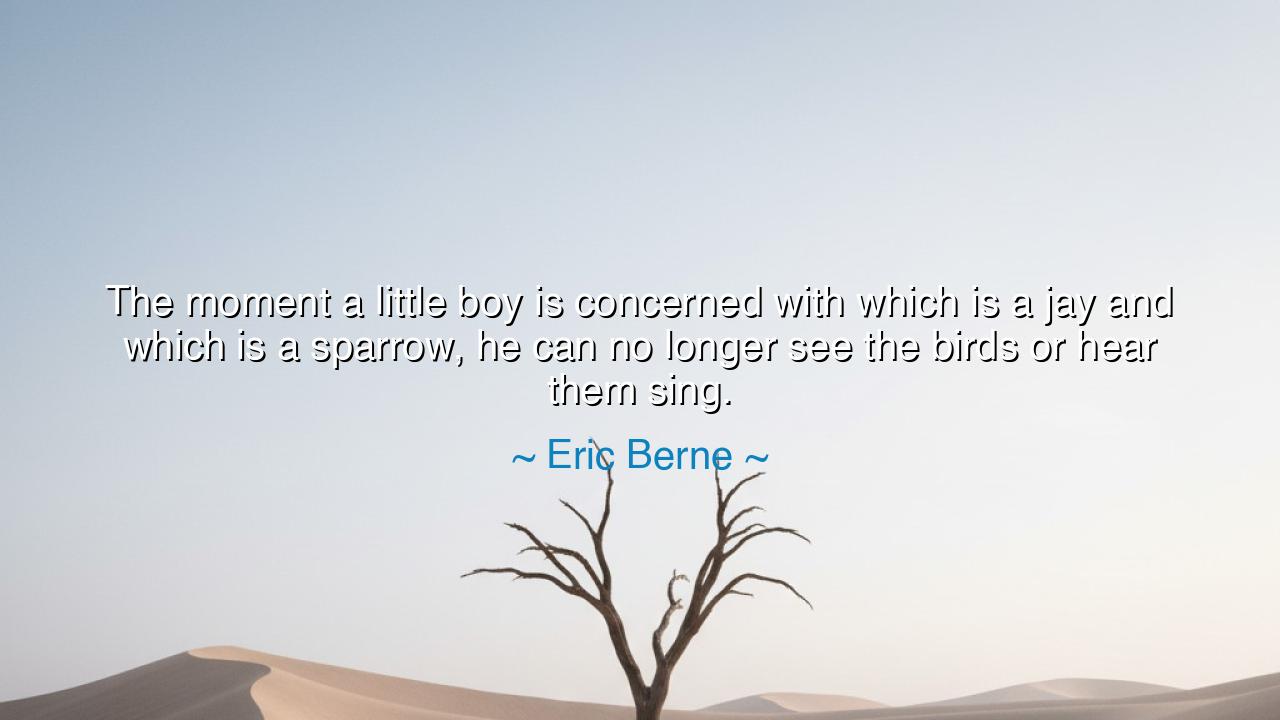
The moment a little boy is concerned with which is a jay and
The moment a little boy is concerned with which is a jay and which is a sparrow, he can no longer see the birds or hear them sing.






Hearken, O children of wonder and perception, to the teaching of Eric Berne, whose wisdom unveils the peril of obsession over trivial distinctions: “The moment a little boy is concerned with which is a jay and which is a sparrow, he can no longer see the birds or hear them sing.” In these words lies a meditation upon the loss of innocent perception, the narrowing of experience through excessive categorization, and the danger of allowing minutiae to eclipse the living, breathing world around us. Berne warns that life’s richness is diminished when attention is consumed by labels rather than presence.
The essence of this reflection is that over-analysis can blind the soul. When the boy focuses solely on names and definitions, he misses the essence of being, the joy of observation, and the poetry inherent in nature. The birds continue their flight and song, vibrant and free, yet the boy, preoccupied with classification, is deaf to their music and blind to their grace. Thus, Berne teaches that life demands attentiveness to experience itself, not merely the mastery of technical distinctions.
Consider the life of Henry David Thoreau, who wandered the woods and shores of Walden Pond with eyes attuned to life’s immediate wonders. Thoreau did not merely catalog species; he observed the patterns, rhythms, and voices of nature. In doing so, he captured the spirit of the birds, the water, and the wind, preserving not just taxonomy, but the living pulse of the world. Berne’s warning echoes here: fixation on labels can obscure the poetry and vitality of existence.
The teaching also illuminates the virtue of presence and wonder. To see and hear is to be fully alive, to engage with the world directly and emotionally rather than abstractly or mechanically. The boy who knows only “jay” or “sparrow” misses the song, the movement, and the life contained within. True perception integrates mind and heart, naming when necessary but never allowing classification to eclipse experience itself. In this lies an ancient principle: wisdom begins with observation, attention, and delight.
Even in modern life, this lesson endures. Scholars, professionals, and even children are often consumed by the need to label, categorize, and quantify. Yet those who cultivate mindful observation—scientists like Jane Goodall, writers like Thoreau, or musicians who hear subtle harmonics—demonstrate that profound understanding emerges not from mere categorization, but from immersive attention and engagement with life. The music, the motion, and the interconnection of all things are lost when the mind latches onto abstraction alone.
Berne’s reflection also carries a moral dimension. To prioritize names over experience is to risk diminishing joy, curiosity, and gratitude. The boy, like any human, has the capacity to witness wonder and participate in the living tapestry of the world. By focusing excessively on trivial distinctions, he forgoes the fullness of life’s gifts—the song of the birds, the light of the day, the movement of the wind—and limits his capacity for awe and empathy.
O children of perception, take this teaching to heart: observe the world with presence, attend to its rhythms and joys, and resist the compulsion to reduce life solely to categories and labels. Let your eyes see the birds, your ears hear their song, and your heart rejoice in the immediate beauty around you. In this attentiveness lies both freedom and wisdom, allowing the soul to engage fully with the living universe.
Thus, let the words of Eric Berne resonate through your days: knowledge is valuable, but wonder and experience are sacred. Do not sacrifice the song of life for the precision of names. Cultivate attentiveness, presence, and delight, and in doing so, you will see, hear, and participate fully in the beauty and vitality of the world that surrounds you.
If you wish, I can also create a practical guide for cultivating mindful observation and wonder, inspired by Berne’s reflection, with exercises to balance learning with direct, joyful engagement with life. Do you want me to do that?






AAdministratorAdministrator
Welcome, honored guests. Please leave a comment, we will respond soon